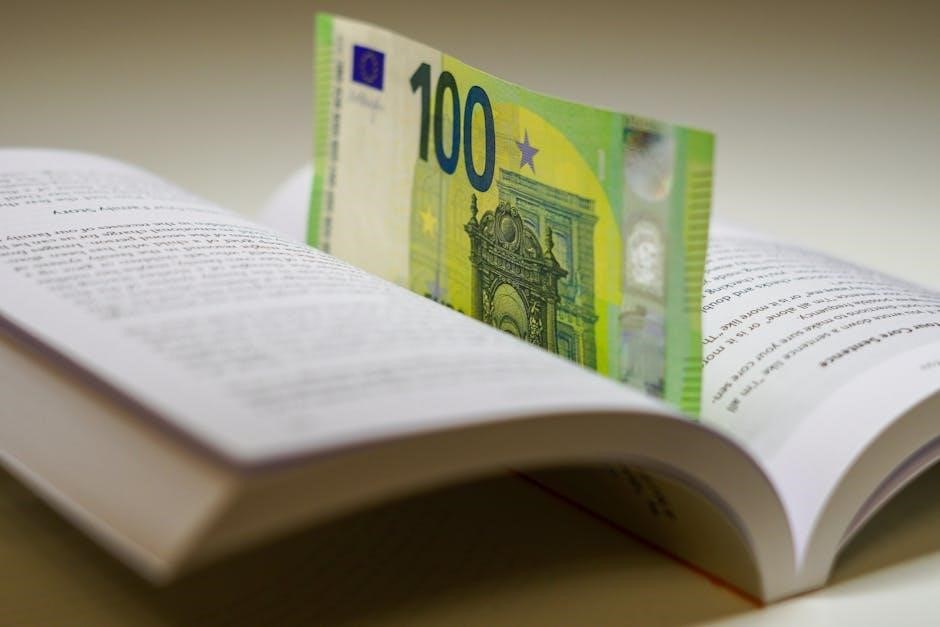Welcome to the AP European History Study Guide! This comprehensive resource helps you master European history from the Renaissance to the present․ Discover essential concepts‚ strategies‚ and tips for success․
1․1 Purpose and Scope of the Study Guide
This study guide is designed to provide a structured approach to mastering the AP European History curriculum․ It covers the essential time periods‚ themes‚ and skills needed for success․ The guide spans from the Renaissance to the present‚ focusing on cultural‚ political‚ and social developments․ It aims to help students build critical thinking‚ analytical‚ and essay-writing skills․ By breaking down complex topics into manageable sections‚ the guide ensures a comprehensive understanding of European history․ Additionally‚ it offers strategies for effective studying and exam preparation․ Whether you’re a seasoned student or just beginning‚ this guide will serve as a valuable resource to achieve your academic goals in AP European History․
1․2 Key Skills for Success in AP European History
Success in AP European History requires a combination of critical thinking‚ analytical skills‚ and effective study habits․ Students must develop the ability to interpret historical events‚ analyze primary sources‚ and synthesize information into coherent arguments․ Strong contextual understanding and chronological reasoning are essential for connecting events across time and themes․ Proficiency in essay writing‚ including thesis development and evidence-based arguments‚ is crucial for the free-response section․ Additionally‚ students should practice identifying and explaining historical causation‚ continuity‚ and change․ Time management during exams and the ability to distinguish between similar historical developments are also vital․ Mastery of these skills will enhance performance and confidence throughout the course and on the AP exam․

Historical Periods in AP European History
This section explores key historical periods‚ from the Renaissance to modern times‚ highlighting major events‚ cultural shifts‚ and political transformations that shaped Europe․
2․1 The Renaissance and Reformation (1450–1600)
The Renaissance marked a cultural and intellectual revival in Europe‚ emphasizing humanism‚ art‚ and science․ Meanwhile‚ the Reformation challenged the Catholic Church‚ sparked by Martin Luther’s Ninety-Five Theses in 1517․ This period saw the rise of city-states like Florence and Venice‚ which became centers of innovation․ The Protestant movement gained momentum‚ leading to religious conflicts and the fragmentation of Western Christianity․ The Renaissance also brought iconic figures such as Leonardo da Vinci and Michelangelo‚ whose works epitomized the era’s creativity․ These dual forces of cultural flourishing and religious upheaval laid the groundwork for modern Europe’s political‚ social‚ and religious landscape․
2․2 The Age of Exploration and the Wars of Religion (1600–1700)
The 17th century was marked by European exploration and colonial expansion‚ with powers like Spain‚ Portugal‚ England‚ France‚ and the Netherlands establishing colonies and trading posts worldwide․ This period also saw devastating religious conflicts‚ such as the Thirty Years’ War (1618–1648)‚ which ravaged much of Europe․ The Eighty Years’ War (1568–1648) led to Dutch independence‚ while the Peace of Westphalia (1648) ended the Thirty Years’ War and established the principle of state sovereignty․ These events shaped Europe’s political‚ religious‚ and global influence‚ fostering both cultural exchange and widespread destruction․ The age of exploration and religious strife laid the foundation for modern nation-states and global trade networks․
2․3 Absolutism and the Enlightenment (1700–1800)
This period saw the rise of absolutism‚ with monarchs like Louis XIV of France‚ Peter the Great of Russia‚ and Frederick the Great of Prussia consolidating power and centralizing authority․ The Enlightenment emerged as a counterpoint‚ emphasizing reason‚ individual rights‚ and intellectual freedom․ Thinkers like Voltaire‚ Rousseau‚ and Locke challenged traditional hierarchies and laid the groundwork for modern political ideologies․ The tension between absolute rule and Enlightenment ideals set the stage for future revolutions and reforms․ This era also witnessed significant cultural and scientific advancements‚ shaping Europe’s political‚ intellectual‚ and social landscape for centuries to come․ Balancing authority and progress defined this transformative age․
Key Themes in AP European History
This section explores the cultural‚ political‚ and social developments that shaped Europe․ Key themes include the rise of nation-states‚ religious conflicts‚ intellectual movements‚ and economic transformations․ These themes interweave across time periods and regions‚ highlighting the dynamic nature of European history; Understanding these overarching ideas is crucial for analyzing specific events and their broader impact․ By focusing on these themes‚ students can better grasp the complexities of Europe’s past and its influence on the modern world․ This approach helps connect historical events to enduring questions about human society‚ governance‚ and progress․
3․1 Cultural and Intellectual Developments
From the Renaissance to the Enlightenment‚ Europe experienced profound cultural and intellectual transformations․ The Renaissance revived classical knowledge and fostered artistic innovation‚ while the Protestant Reformation challenged religious authority․ The Scientific Revolution introduced empirical methods‚ reshaping understanding of the natural world․ The Enlightenment emphasized reason‚ individual rights‚ and progress․ These movements intersected‚ creating a dynamic cultural landscape․ Key figures like Leonardo da Vinci‚ Martin Luther‚ Galileo‚ and Voltaire exemplified these shifts․ Understanding these developments is essential for grasping Europe’s evolving identity and the roots of modern thought․ This section explores how these ideas influenced art‚ religion‚ science‚ and philosophy‚ shaping the continent’s cultural heritage․
3․2 Political and Diplomatic History
European history is deeply shaped by political and diplomatic developments‚ from the rise of nation-states to the complex alliances of modern times․ The Renaissance saw centralized monarchies emerge‚ while the Reformation sparked religious conflicts․ The Peace of Westphalia (1648) established sovereignty and non-interference‚ reshaping diplomacy․ Absolutism dominated the 18th century‚ with rulers like Louis XIV exemplifying centralized power․ The Napoleonic Wars and Congress of Vienna (1815) redrew Europe’s map‚ emphasizing balance of power․ Nationalism and imperialism in the 19th century led to tense alliances‚ culminating in World Wars I and II․ The Cold War further divided Europe politically․ This section explores how political systems‚ treaties‚ and diplomatic strategies have influenced Europe’s development and global relations․
3․3 Social and Economic Transformations
European history is marked by profound social and economic changes that reshaped societies and economies․ The Renaissance saw the rise of trade and banking‚ while the Agricultural Revolution increased food production․ The Industrial Revolution transformed Europe with factories‚ urbanization‚ and the emergence of a factory system․ Social hierarchies shifted as the middle class grew‚ and labor movements responded to industrial exploitation․ The 20th century brought the welfare state and globalization‚ altering economic structures and social safety nets․ This section examines how technological advancements‚ economic systems‚ and social movements have driven Europe’s transformation over centuries‚ emphasizing the interconnectedness of societal and economic progress․

Study Tips and Strategies
Mastering AP European History requires effective study habits․ Start early‚ break material into manageable chunks‚ and focus on understanding key themes․ Regular practice and self-testing reinforce retention․ Analyze primary sources‚ practice essay writing‚ and review past exams to build confidence and improve performance․ Stay organized‚ use flashcards for key terms‚ and collaborate with peers for deeper understanding․ Prioritize active learning techniques and seek feedback to refine your approach․ Consistency and strategic planning are key to excelling in this challenging but rewarding course․
4․1 Time Management and Organization
Effective time management and organization are crucial for success in AP European History․ Create a structured study plan‚ breaking the syllabus into manageable sections․ Prioritize chapters based on difficulty and set realistic daily goals․ Use calendars or planners to track assignments‚ reading‚ and review sessions․ Develop a filing system for notes‚ primary sources‚ and practice questions․ Dedicate specific times for active learning‚ such as outlining chapters or analyzing historical events․ Regularly review and organize notes within 24 hours of class to improve retention․ Implement the Pomodoro Technique for focused study sessions‚ balancing 25 minutes of work with 5-minute breaks․ Incorporate practice questions and essays into your schedule to apply knowledge․ Stay organized digitally or physically‚ ensuring easy access to materials․ By maintaining a disciplined routine‚ you’ll master the course content efficiently and reduce stress․
4․2 Effective Note-Taking and Review Techniques
Mastering note-taking and review techniques is vital for excelling in AP European History․ Use the Cornell Method to organize notes‚ separating summaries from details․ Focus on key terms‚ dates‚ and concepts during lectures․ After class‚ review and condense notes‚ highlighting essential information․ Implement active recall by testing yourself on historical events and themes․ Summarize complex topics in your own words to reinforce understanding․ Organize notes chronologically or thematically for better retention․ Regularly review past material to build connections between periods․ Use flashcards for vocabulary and major events․ Practice outlining essays from memory to refine writing skills․ Consistency in reviewing ensures long-term retention and prepares you for the exam․

Practice Questions and Exam Preparation
Engage with practice questions and exam strategies to build confidence․ Familiarize yourself with question formats‚ timing‚ and scoring․ Use sample questions to identify strengths and areas for improvement․
5․1 Multiple-Choice and Short-Answer Practice
Mastering multiple-choice and short-answer questions is crucial for exam success․ Practice identifying key themes‚ causation‚ and patterns in historical events․ Focus on understanding question formats‚ such as “Which of the following․․․” or “Compare and contrast․․․”․ Develop strategies like eliminating incorrect answers and using context clues․ For short-answer questions‚ practice concise‚ clear responses using specific historical examples․ Review sample questions to understand common question types and improve time management․ Analyze your mistakes to refine your approach․ Regular practice builds familiarity with the exam style and enhances your ability to articulate historical concepts effectively․ Use practice sets to simulate test conditions and track your progress over time․
5․2 Essay Question Strategies and Examples
Mastering essay questions requires clear thesis statements‚ well-structured arguments‚ and relevant historical examples․ Focus on addressing all parts of the question and organizing your response logically․ For comparative essays‚ emphasize similarities and differences‚ while change-over-time essays should highlight developments and continuities․ Practice outlining your essays to ensure clarity and coherence․ Use specific examples from different time periods and regions to strengthen your analysis․ Review sample essays to understand scoring criteria and common pitfalls․ Time management is key: spend 10 minutes planning and 20 minutes writing․ Regular practice with past exam questions will improve your ability to articulate complex historical ideas effectively․ Learn from feedback to refine your writing and argumentation skills․

Additional Resources for Success
Enhance your preparation with recommended textbooks‚ online platforms‚ and study groups․ Utilize resources like Khan Academy‚ Crash Course‚ and AP Euro forums for deeper understanding and practice․
6․1 Recommended Textbooks and Online Materials
To excel in AP European History‚ utilize trusted resources like A History of Western Society and The Making of the West․ Online platforms such as Khan Academy‚ AP European History YouTube channels‚ and SparkNotes provide valuable study aids․ The College Board’s official study guide and practice exams are essential for exam preparation․ Additionally‚ websites like Quizlet and Crash Course offer interactive content to reinforce key concepts․ For deeper analysis‚ explore primary sources through the Internet History Sourcebook․ These materials complement your coursework‚ offering diverse perspectives and tools to master the curriculum effectively․



